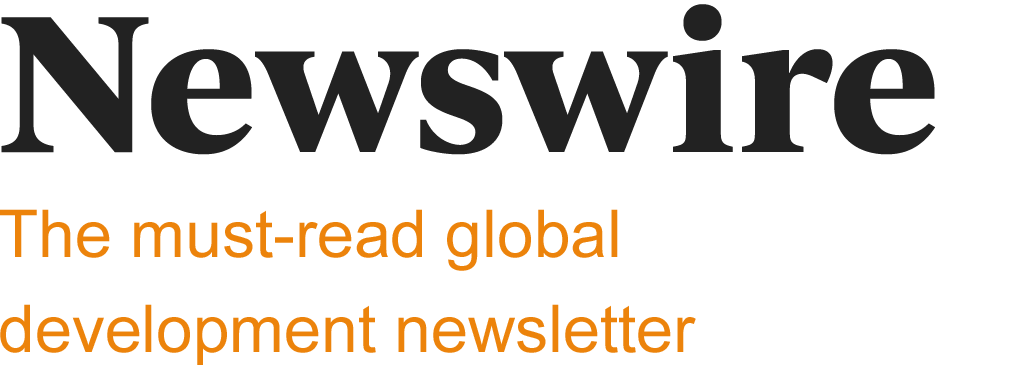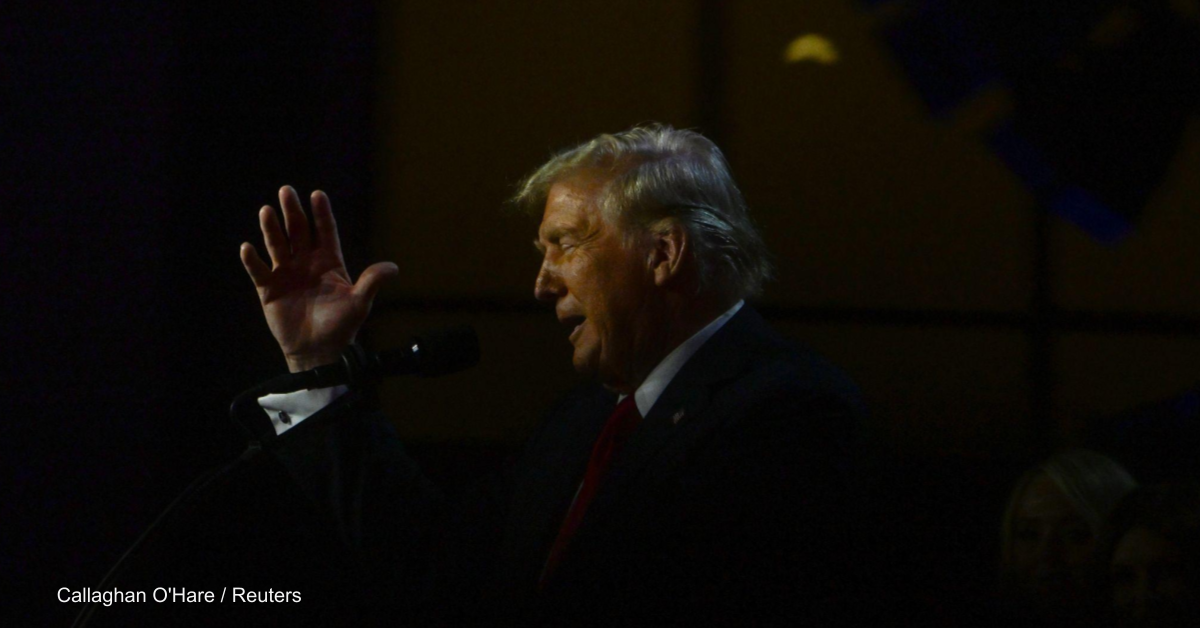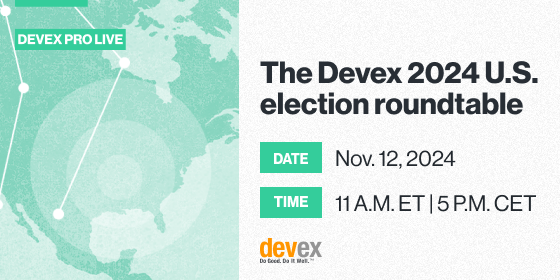|
And could localization be the bright spot of his administration's agenda?
|
|
|
Donald Trump didn’t just win the U.S. presidency, he blew the contest out of the water and, in the process, roared back to political life after the Jan. 6 insurrection, a string of criminal convictions, two assassination attempts, and a campaign marked by promises of change but also punctuated by grievance and fear.
So what’s next? Good luck trying to figure that out (the pollsters clearly couldn’t). This is a man who thrives on unpredictability, at home and on the world stage. But we can read some tea leaves based on history and rhetoric — and those tea leaves suggest a very different direction for America’s approach to development. In the months and years ahead, our team will be your go-to news source on what lies ahead for global development in a second Trump administration, whether it’s on climate and health, or reform of the international financial architecture, or cuts to USAID and the United Nations. Today, we start with an extensive report of what we know so far. |
|
SPECIAL NOTICE
|
|
Triumphant Trump
Uncertainty is a hallmark of the soon-to-be president, but we’ve seen a common thread emerge in Trump’s “America first” foreign policy: He’s a staunch nationalist who’s willing to slap tariffs on countries, shut down the border, tear up international agreements, and take a more transactional approach to alliances — which could extend to foreign assistance.
The implications for development are profound. In the past, draconian aid cuts had been largely thwarted by an enduring — albeit dwindling — bipartisan consensus in the U.S. Congress. But with Republicans taking over the White House and Senate, and quite possibly the House of Representatives — and Trump more in command of the party than ever — drastic cuts could be back on the table. “The difference between today and 2016 is that today, Trump understands a little bit more about how the government works,” George Ingram of the Brookings Institution tells my colleague Colum Lynch. “This time around, you’re seeing Republicans, particularly in the House, that are unwilling to buck Trump.” Max Primorac, a former top USAID official during the first Trump administration, pointed out just how much the agency’s budget has ballooned in recent years. “In 2018, we had a $20 billion budget at USAID, and last year it was $44 billion,” he said during an interview at Devex World. “And yet, despite that, the outcomes are not good. We have more poverty, we have more hunger, we have more, as a result, more political instability.” Primorac was the lead author of a chapter on USAID in Project 2025, the infamous over 900-page blueprint created by The Heritage Foundation. Trump disavowed Project 2025 after Democrats used it as a cudgel against him, but the fact that well over 100 former Trump administration and campaign officials contributed to it means there’s a high likelihood that at least some of them will end up in a second Trump White House. Project 2025 also outlines programs that have long been anathema to conservatives and would likely be on the chopping block, including those pertaining to climate change, reproductive rights, LGBTQ+ policies, and anything that smacks of pushing a progressive agenda in other countries. On the flip side, faith-based aid groups could stand to benefit under a Republican-led USAID and State Department, as could agencies that partner with the private sector, such as the U.S. International Development Finance Corporation. One intriguing bright spot? Localization. As Primorac argued during the interview, it costs less and is more effective: “One rule that we should put immediately is any new initiative that we have in any country, that if there's any local organizations that are already doing it, we don't compete with it. We support it.” Watch the full interview: What the US election means for global development ICYMI: A US conservative's plan to beat the 'aid industrial complex' |
|
Sponsored by DEY. Ideas + Influence
Why the era of quiet philanthropy is over
Rimjhim Dey discusses why philanthropic, development, and humanitarian organizations must abandon their behind-the-scenes approach and be boldly visible if they want to influence change. |
|
What’s in, and what’s out?
Some Republicans may support localization, but what else do they support — or oppose? Our team compiled an essential primer on key development institutions and policies that could see seismic changes under Trump. Here are just a few highlights:
Climate Change: In 2017, when Trump said, “I was elected to represent the citizens of Pittsburgh, not Paris,” that pretty much told you everything you needed to know about his approach to the Paris climate agreement, which could be the first casualty as soon as Trump takes office. Withdrawing from the agreement would be a hugely demoralizing blow to other countries’ climate ambitions, particularly any financial commitments that come out of the 29th U.N. Climate Change Conference in Azerbaijan next week. As for America’s own climate commitments, expect fossil fuel production to come roaring back — though to be fair, the spigot never stopped under Joe Biden. In addition, government support for renewable energy projects could take a backseat, although it remains to be seen how much of the Inflation Reduction Act — which includes tax credits to cut U.S. emissions by up to 11% below 2005 levels — will be rolled back. The World Bank: Under Ajay Banga, the bank made climate change part of its remit. It’s pretty safe to say that will change in some fashion. In fact, Project 2025 advocates ditching the bank altogether. It says the U.S. should withdraw from and “terminate its financial contribution” to the World Bank and the International Monetary Fund, recommending instead that the U.S. provide economic or humanitarian aid unilaterally to avoid “expensive middle-men” or entities with interests that don’t align with the U.S. Whether Trump goes to such lengths remains to be seen. Perhaps one reassuring silver lining for the bank is that Trump provided it with a capital increase last time around — a fact Banga quickly trotted out when asked about the U.S. election at the bank’s annual meetings last month. “My view of him, having dealt with him for years, is that at the end of the day he understands the value if you could put it in the terms that makes sense for what he's trying to get done for his administration's policies,” Banga told Reuters. The United Nations: Trump and the U.N. have always had a strange dynamic. On the one hand, Trump appeared to enjoy the pomp and spectacle of the U.N. annual summit of world leaders, and U.N. Secretary-General António Guterres tried to cultivate a warm personal relationship with him. On the other hand, Trump gutted financial support to myriad U.N. programs. For example, his administration’s refusal to pay its entire peacekeeping bill has contributed to a serious U.N. liquidity crisis. Richard Gowan of the International Crisis Group tells Colum he believes Guterres and his team “are as prepared as they can be for what they expect to be a financial firestorm as Trump comes back.” He’s less optimistic about other multilateral scenarios, including the World Health Organization. “The litmus test of exactly how anti-UN the new administration will be is the WHO. Will Trump go back to his 2020 plan to withdraw, which Biden halted, or will he let bygones be bygones.” The changes don’t stop there. Our in-depth report explores the effects a Trump administration could have on a range of issues, from reproductive rights to food and agriculture to the wars in Ukraine and Gaza. Also, stay tuned for a special episode of our This Week in Global Development podcast tomorrow that will dissect the election results. And on Tuesday, Nov. 12, we’ll host a roundtable of experts with direct experience of politics and aid in the U.S. to discuss what a second administration of Donald Trump means for the future of U.S. foreign aid — from funding and leadership to LGBTQ+ and reproductive rights. Save your spot now to join the conversation. Read the deep dive: Donald Trump won. What does that mean for development? |
|
SPONSORED ANNOUNCEMENT
Gender inclusion: A blueprint for early-stage enterprise success
Pathways to Growth, Acumen, and Value for Women’s new report reveals how gender-smart business practices drive success in early-stage companies. It offers actionable insights for social enterprises and impact investors, showing proven methods to enhance opportunities for women in emerging markets. Whether new to gender equality or looking to deepen your approach, this guide is essential for advancing gender inclusion. |
|
In other news
Drought has heavily affected the lives of more than 420,000 children in the Amazon, where livelihoods and essential services have been disrupted. [UNICEF] 2024 is set to become the world’s warmest on record, as global temperatures are on track to exceed 1.5 degrees Celsius above pre-industrial levels. [BBC] Prince William on Wednesday announced the five winners of the Earthshot Prize. The winning organizations will get £1 million ($1.3 million) each to fund their advocacy. [EuroNews] 
|
|
Thank you for reading today’s Newswire, edited by Fiona Zublin, copy edited by Florence Williams, and produced by Yula Mediavillo. Have a news tip? Email [email protected].
Forwarded by a friend?
Sign up here to receive the Newswire directly.
|
|
Devex thanks our partners for supporting our newsletters.
Our editorial content remains independent. Interested in partnering with us? Get in touch. |
|
Connect with us:
|







